Handing over Singapore in good order: The legacy of Lee Hsien Loong
Singapore’s third Prime Minister Lee Hsien Loong’s tenure has left its mark on the political and societal landscape of Singapore, with a pivot towards a softer, more collaborative approach to governance, analysts say.
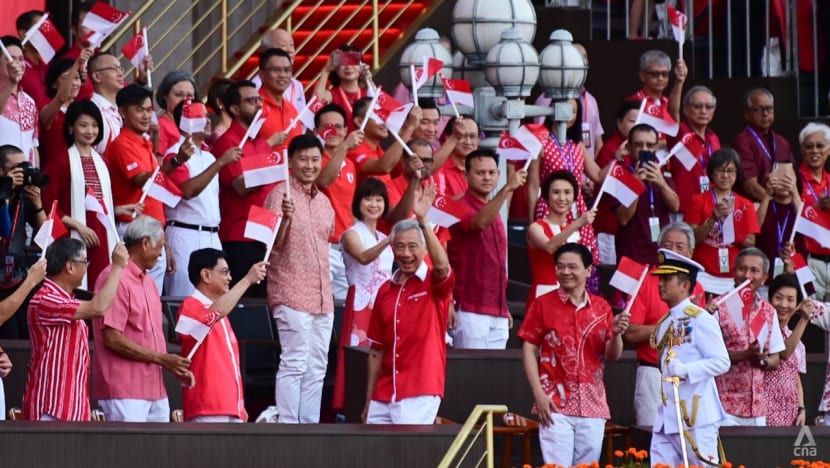

This audio is generated by an AI tool.
SINGAPORE: Prime Minister Lee Hsien Loong has said on multiple occasions that he wants to hand Singapore over to his successor “in good order”.
And in good order he has: By many matrices, the country’s third Prime Minister is indeed leaving the state of the country better than before he took office back on Aug 12, 2004 – one that is more prosperous, developed and equal.
Analysts told CNA that Mr Lee’s tenure has left its mark on the political and societal landscape of Singapore, as he led the country through periods of crisis and recovery, and a pivot towards a softer, more collaborative approach to governance.
He has been a leader whose government implemented policies on the domestic front to help people uplift themselves, who has taken on the challenge of difficult and controversial decisions such as repealing the law banning gay sex, and who has looked towards Singapore's long-term future with infrastructure projects such as the Tuas mega port, the analysts added.
Over the last 20 years, Singapore’s gross domestic product has more than doubled, from S$228 billion to S$532 billion (US$168 billion to US$392 billion).
The median gross monthly income of Singapore residents has also climbed from S$2,326 to S$5,197.
Under Mr Lee’s watch, Singapore saw lower inequality, with the Gini coefficient after government transfers and taxes dropping from 0.42 to 0.37.
Annual airport passenger arrivals more than doubled, from 14.3 million to 29.5 million.
Singapore’s economy has also benefited from a surge in free trade agreements, from just five in 2004 to the current 27.
The Gini coefficient shows the gap between the richest and poorest in a country’s income or wealth distribution, with 0 being perfect equality and 1 being perfect inequality.
Mr Lee has also steered Singapore into becoming a hotspot for the world, with annual visitor arrivals climbing from 8.3 million to 13.6 million.
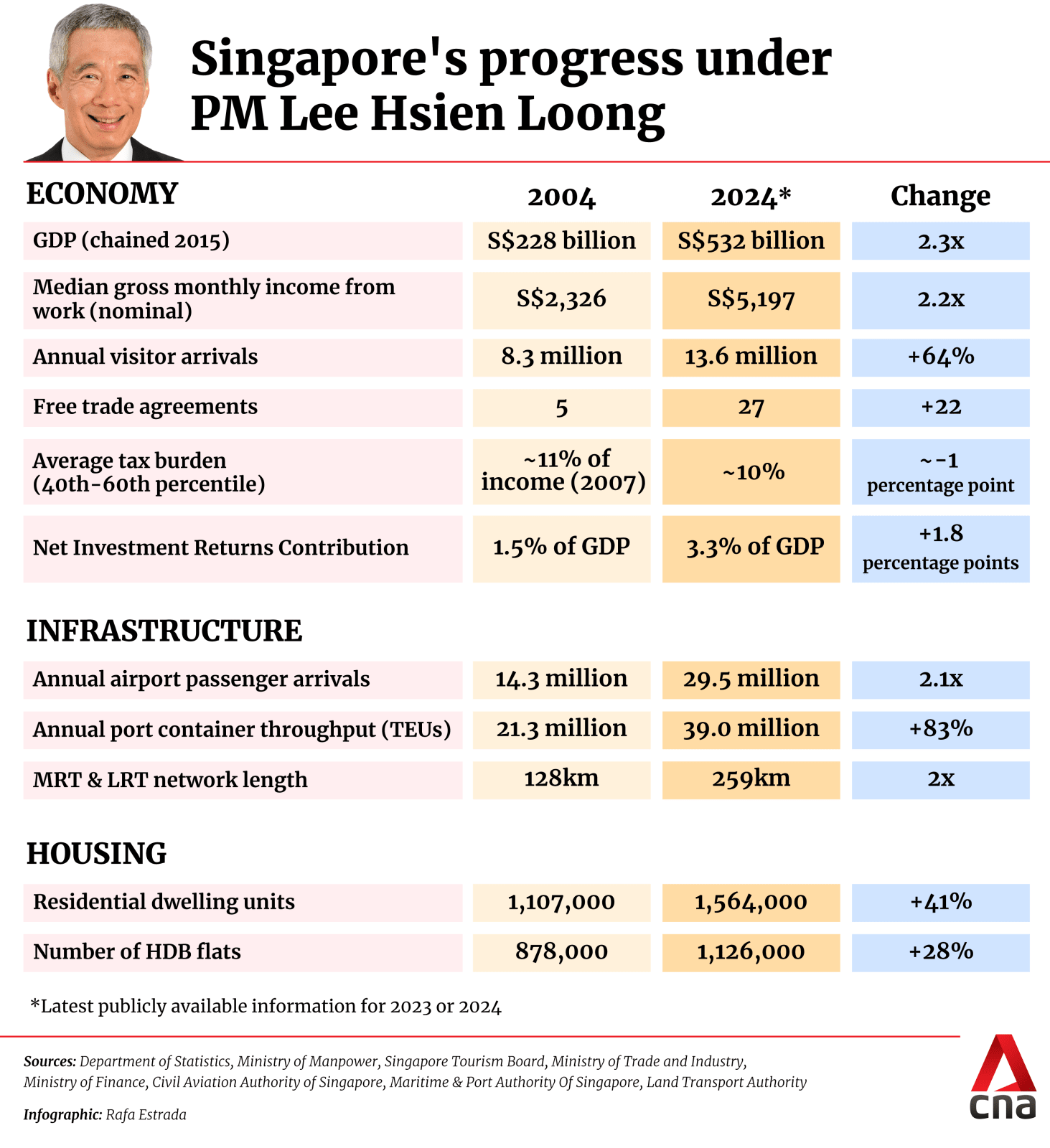
EMPHASIS ON THE SOCIAL
Mr Lee’s government has been ahead of the curve in dealing with social stratification, identity politics, class and race, said Dr Gillian Koh, senior research fellow at the Institute of Policy Studies (IPS).
“The first and most important development to curb severe social stratification in Singapore are measures to ensure that Singapore practises a form of ‘continuous meritocracy’,” said Dr Koh.
Educational reforms have softened the stark streaming that was a major feature of Singapore’s high-stakes, academically focused school system, and given Singapore students more diverse pathways to success.
The government under Mr Lee has invested more in education, with its annual recurrent expenditure on education climbing from S$5 billion in 2004 to S$12.9 billion in 2022.
The number of infant care and childcare centres has also grown from 722 in 2004 to 2,470 currently.
Dr S Vasoo, Second Advisor to Ang Mo Kio GRC Grassroots Organisations, said Mr Lee has sought to shift the perception of the Institute of Technical Education (ITE) by shining a spotlight on the ITE College Central campus located in Ang Mo Kio.
An MP from 1984 in Bo Wen SMC and then Tanjong Pagar GRC, Dr Vasoo first started out in politics working the ground with Mr Lee in Ang Mo Kio. He continued to help out in Ang Mo Kio after stepping down as MP in 2001.
“It was seen as the last resort in the educational trough, and people attached a negative label to it, that underachievers and all went there,” he said of the ITE pathway.
Since 2013, Mr Lee has held his annual National Day Rally at the venue.
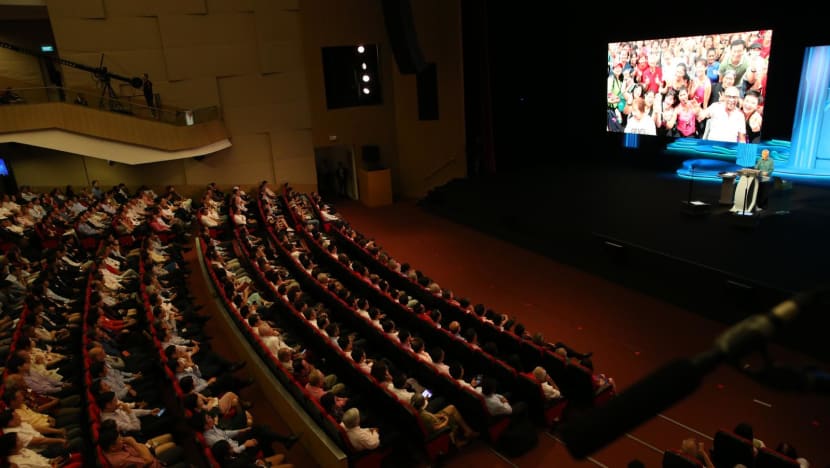
“That has helped people to know about it and enhanced the image of ITE,” said Dr Vasoo.
“Getting the students involved and getting others to see how they can participate, does in a way inject a feeling of achievement and a feeling of improvement.”
Under Mr Lee’s watch, more support has been given to lower-wage workers, with the Progressive Wage Model and Workfare scheme, noted Dr Koh.
“Also extremely important are all the moves the government has made to ensure we have an inclusive society – to take care of the poor, the disabled, and the marginalised. This is epitomised by the Enabling Plans and their implementation; the 2022-2023 decisions to allow for the wearing of the tudung in healthcare institutions and the repeal of 377A,” she said.
Ms Nydia Ngiow, managing director of BowerGroupAsia in Singapore, said the series of support packages, including cash handouts, vouchers and rebates to help Singaporeans cope with the rising costs of living, also represents a shift by Mr Lee away from his predecessors’ policies.
Singapore has traditionally emphasised self-reliance and targeted assistance even amid crises, for instance, during the 1997 Asian financial crisis, noted Ms Ngiow. Back then, the government of then-PM Goh Chok Tong favoured tax rebates over cash handouts to help citizens and businesses cope.
“Furthermore, the continuity of cash handouts since 2020 despite significant economic recovery also signals a willingness to implement more social welfare measures,” she said.
In Mr Lee’s time in office, the population of Singapore has grown from 4.2 million to 5.9 million, with the total fertility rate going in the other direction, falling from 1.26 to a historic low of 0.97.
The population is fast ageing, with the percentage of citizens aged 65 and over currently 19 per cent, up from 8 per cent in 2004. This number is expected to hit 25 per cent by 2030.
The government’s annual operating expenditure on healthcare has climbed almost 10-fold, from S$1.6 billion in 2004 to S$15.9 billion in 2022.
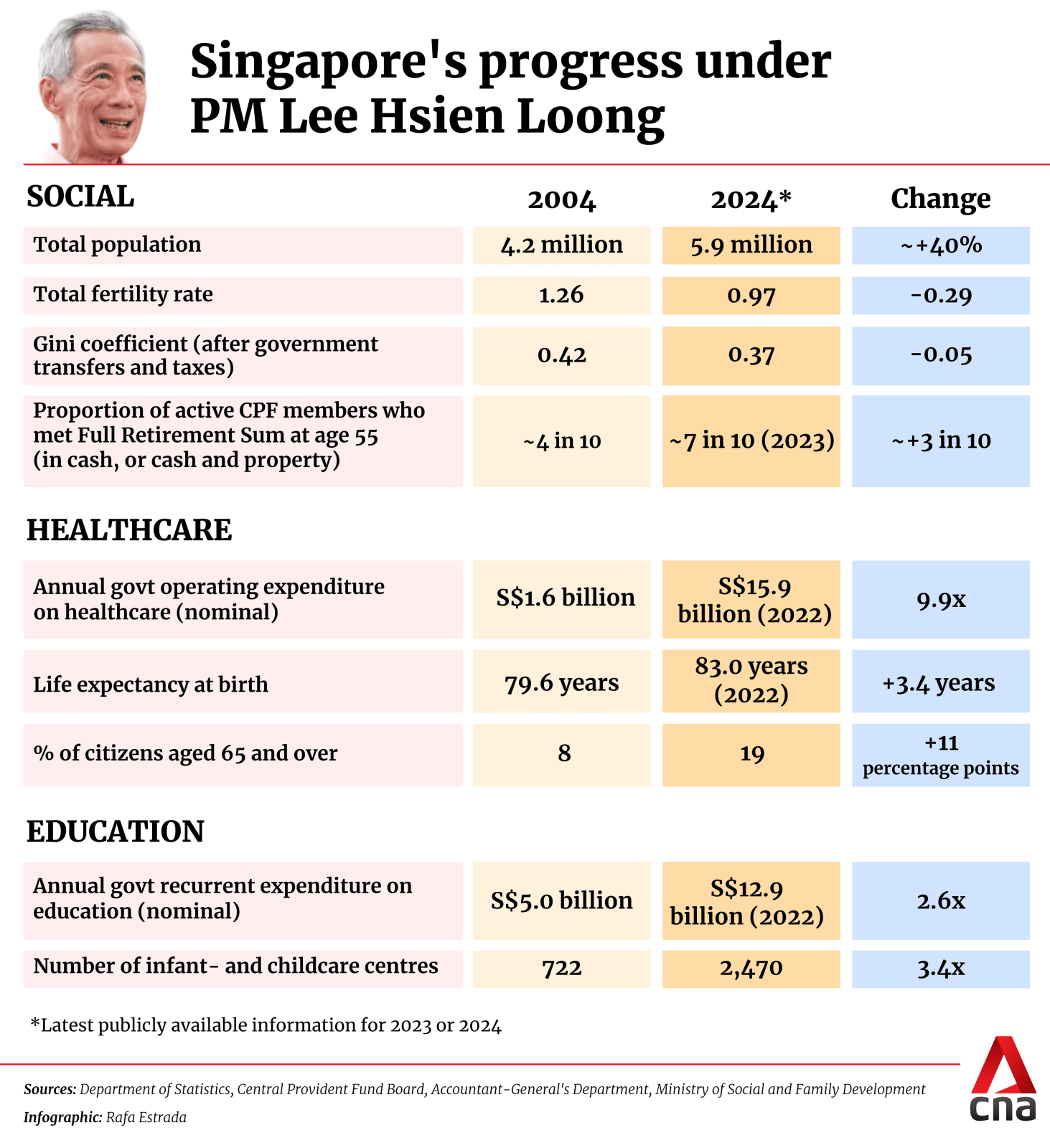
IMPACT ON POLITICS
Political analysts told CNA that Mr Lee has shaped Singapore’s political and governance landscape significantly.
Under him, the reserved election system for the presidency was introduced to guarantee minority representation, and the number of Non-Constituency MPs increased, and provided with the same voting rights as elected MPs, said Dr Koh.
Constitutional amendments had been passed in November 2016, to reserve the elected presidency for candidates of a particular racial group if there had not been a president from the group for the five most recent presidential terms. It saw the walkover victory of Madam Halimah Yacob, Singapore’s first female president, the following year.
The government has also improved and intensified its process of public engagement in policy-making during Mr Lee’s tenure, said Dr Koh.
She cited the creation of “Alliances for Action” – where people from the public and private sectors identify issues to improve conditions in their industry – and for businesses, the industrial transformation maps for 23 sectors.
“This is very involved governance processes and have been found to be effective in delivering practical solutions with joint commitment of the relevant parties to ensure effective outcomes,” she said.
Ms Ngiow added that Mr Lee has over his term in office adapted his leadership style from top-down to one that is more consultative, evidently so after the 2011 General Election where the PAP won a record low 60.1 per cent of votes amid domestic discontent over various issues.
Such a consultative approach is expected to persist under the leadership of his successor Deputy Prime Minister and Finance Minister Lawrence Wong, who has launched initiatives like Forward SG as a continuation of this trend, she said.
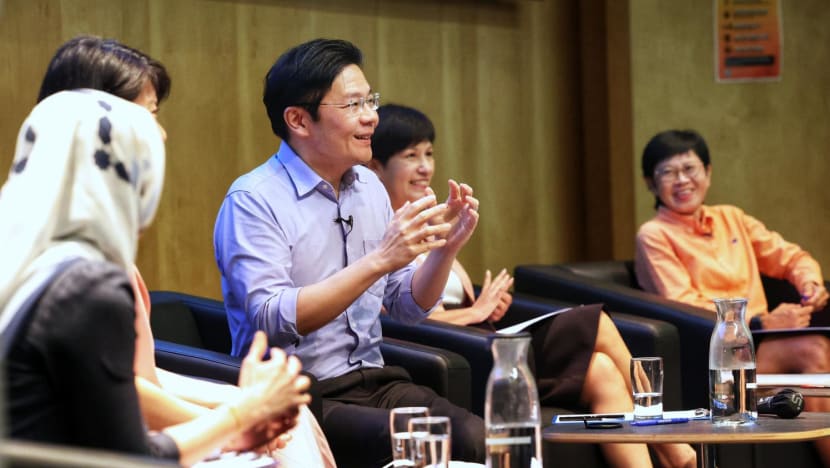
Assoc Prof Bilveer Singh, deputy head of the Department of Political Sciences at National University of Singapore, thinks Mr Lee has made the government more accountable to the electorate by overseeing the rise of a more robust political opposition, including naming a Leader of the Opposition, engaging the public on critical issues and tolerating responsible anti-establishment perspectives.
Following the 2020 General Election, Mr Lee formally designated Workers' Party chief Pritam Singh as the Leader of the Opposition, noting that the election results reflected a clear desire for a diversity of voices in parliament.
“If asked what could well be his most lasting legacy, it would likely be a combination of his ensuring national political and economic growth continued throughout the COVID pandemic, and his meticulous preparation for the smooth handover of the reins of government administration to the 4G PAP leaders,” said Assoc Prof Singh.
INFRASTRUCTURE BOOM
Mr Lee also oversaw an infrastructure boom during his tenure. Over the last 20 years, the number of HDB flats in Singapore climbed from 878,000 to 1.1 million.
Dr S Vasoo said that when some blocks in Ang Mo Kio were identified for the Selective En bloc Redevelopment Scheme (SERS), Mr Lee personally spoke to residents to understand their concerns.
Apart from financial aspects such as repayment and costs, Mr Lee was also conscious of the social impact, including disruption to residents’ social life and support networks, said Dr Vasoo.
The country’s MRT and LRT network length also doubled in Mr Lee’s tenure, from 128km to 259km.
Singapore’s maritime activity also boomed, with annual port container throughput growing from 21.3 million to 39 million twenty-foot equivalent units (TEU).
Ms Ngiow noted that Singapore’s position as a global hub for business, tourism and commerce has been boosted through multiple strategic infrastructure projects within Mr Lee’s tenure.
“Chief among these is the development of Jewel Changi Airport. Initially conceived to expand aviation capacity, Jewel’s integration with retail and leisure facilities transformed it into a sought-after destination for travellers,” she said.
Another megaproject is the Tuas Port which, when fully completed in 2040, will double Singapore’s maritime capacity and increase efficiency, further solidifying Singapore’s status as a key transport player, said Ms Ngiow.
MAKING A MARK AT THE GRASSROOTS
Beyond his role at the national level, Mr Lee is an inspirational mentor, a detail-oriented team player and a compassionate leader who stayed in touch with the ground, long-time grassroots volunteers and former MPs told CNA.
Mr Lee has been an MP for Teck Ghee since his political debut in 1984, first in a Single Member Constituency and then as anchor minister of Ang Mo Kio Group Representative Constituency.
He often seeks his grassroots leaders’ advice on constituency matters, trusting and relying fully on their input to make certain decisions, Teck Ghee Citizens’ Consultative Committee (CCC) chairman Gerald Singham told CNA.
CCCs plan and lead major grassroots activities within constituencies, oversee local assistance programmes, and organise major fund-raising projects and national campaigns.
“I would say that he is not ideological, in the sense that whenever we have a grassroots discussion, very often he doesn’t give his point of view first. He doesn't say: ‘Okay this is what I want, now what do you all think?’ He likes to hear from us, and then he gives his view,” said Mr Singham, who has been working with Mr Lee since 2001.
Former Ang Mo Kio GRC MP Ang Hin Kee, who was in Mr Lee’s team from 2011 to 2020, said that while the Prime Minister is “evidence-based, seeking proof of views that were put across” when addressing matters, he also values views that convey emotions and how people feel.
Mr Ang added that Mr Lee has a sharp eye for details. For instance, he was always concerned whether the town council had set aside enough reserve funds to replace old lifts when needed, and whether older and non-English-speaking residents received adequate attention about developments within the constituency.
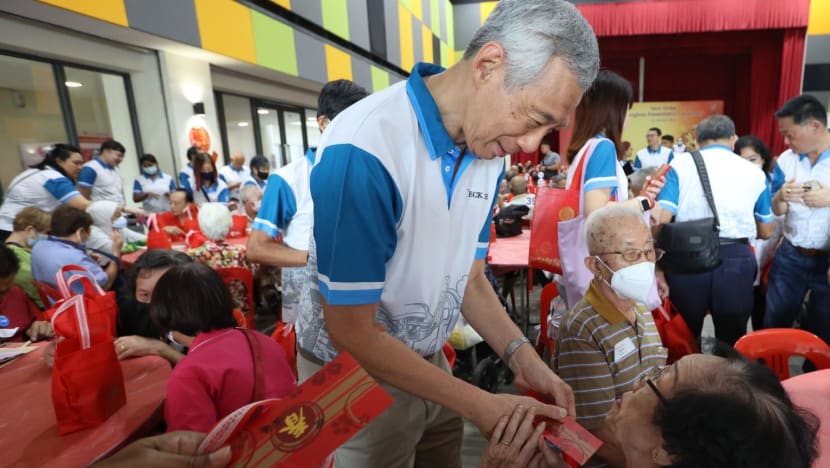
Teck Ghee Community Club Management Committee (CCMC) chairman Toh Kok Wee said the Prime Minister is “always open to ideas”, and takes “collective decisions” with his grassroots leaders on community matters.
CCMCs manage and maintain all community clubs across Singapore, and organise programmes to bring residents together.
Former MP Lee Bee Wah, who was part of Mr Lee’s Ang Mo Kio GRC team when she first entered politics in 2006, highlighted the trust Mr Lee had in his team.
“He gave us a free hand to do our work in our own constituencies. As and when we needed guidance, he was always there,” said Dr Lee, who later moved to Nee Soon GRC where she served until 2020.
“Once there was an issue that kept me up at night, I could not sleep and decided to send him an email at 2am. To my surprise, he replied immediately! He leads by example.”
Mr Toh shared that Mr Lee is very keen on the constituency’s own leadership renewal process, and gives a lot of opportunities to the younger volunteers like himself to take on leadership roles.
A Teck Ghee resident himself, the 43-year-old has been volunteering in the ward since his early 20s, when he was inspired by his father who was also a volunteer.
He was uncertain when Mr Lee first asked him to lead as he felt he was still quite young – under the age of 40 – back then, and that there were more senior volunteers who were more capable of holding the role. However, Mr Lee’s belief in him gave him the confidence to step up eventually, in October 2020.
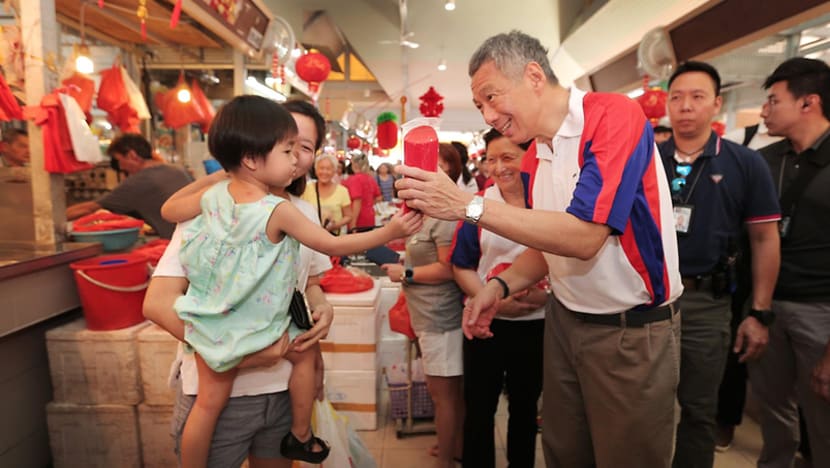
Mr Singham noted that Mr Lee’s position, as the leader of the country’s government and an MP, gives him an insight into how good or bad national policies are.
“Because he's the PM and he's an MP, he wants to know the ground situation, to see how his government's policies are impacting the people on the ground,” he said.
When the social media era kicked in and the Prime Minister took to platforms such as Facebook, he made sure to use it not just to share his posts and photos, but also to gather sentiments from the people, said Mr Singham.
“Now I'm sure when those people criticise him and criticise the PAP and all that, I'm sure that hurt him sometimes. But he is very mature about it. This is politics, right? He must also know what people who are not supportive are saying,” he said.
Mr Singham added that Mr Lee has a “very compassionate heart”. If a grassroots leader or member is hospitalised, he will either visit them or call them, depending on his schedule.
“When a family member of a grassroots leader or a grassroots leader passes away, and if he’s in Singapore, he will always come to the wake despite his busy schedule,” said Mr Singham, who received a handwritten condolence note from Mr Lee when his mother died in 2006.
“Late at night, he will come for the wake. And when he comes up, there's no media, no preparation, nothing. So you cannot say he's coming because ‘wayang’ or whatever. No press, quietly he will just come.”
Additional reporting by Chew Hui Min.


















